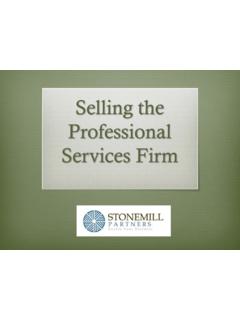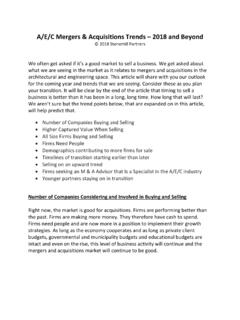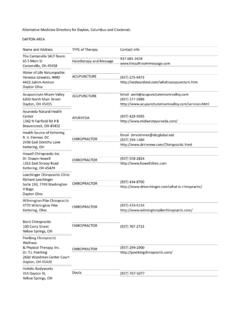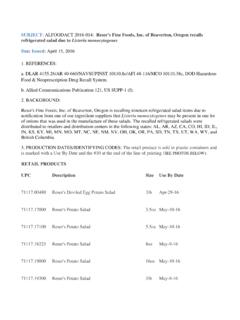Transcription of 6 tips for creating advertising that’s not misleading
1 6 tips for creating advertising that s not misleadingIn recent years regulators have been cracking down heavily on advertising they consider message is clear: Consumers are entitled to reliable, truthful and accurate information, and sellers must compete on a level playing field when advertising their products. Many well-known businesses have come under the spotlight, including ALDI, Bet365, Dulux, Heinz, Optus, Reckitt Benckiser, Smith s and is common and easy for complaints about advertising to be referred to a regulator typically by a disgruntled competitor, customer or consumer don t have the resources to take on all cases, but in our experience will often take action where the advertising could cause widespread consumer detriment, and particularly where a well-known business is with regulators can be a massive drain on business resources, not to mention the costs and potential bad publicity involved.
2 To keep your advertisements out of trouble, the key question to ask yourself is: Does the overall impression match the facts? If the answer is no , you need to go back to the drawing the following pages we provide some general tips and real case study examples to help you create attractive advertising that s not misleading . March 2017#1#2#3#4#5#6#1#2#3#4#5#66 tips for creating advertising that s not misleadingView your claims and statements from the perspective of the potential customerYour claims and statements must have a reasonable basisYour claims must be capable of substantiation if requiredDisclaimers must not contradict the headline messageTake special care with comparative advertisingTreat social media as advertising and make sure reviews are genuine#1tipView your claims and statements from the perspective of the potential customer zCreate an impression that is accurate and consistent with the message you want to convey.
3 ZClaims and statements should be easy to understand. zGive the full picture and do not leave out any important companies A recent case involving a free bet promotion by Bet3651 highlights the importance of conveying an accurate message when making offers, and considering - from a customer s perspective - the overall impression that an offer happened?Bet365, a large online betting provider, ran a promotion offering $200 FREE BETS FOR NEW CUSTOMERS in Australia. The free bet offer had several restrictions that Bet365 did not bring to customers attention. These included customers having to deposit and gamble their own money before being able to withdraw any the outcome? The Federal Court found that Bet365 s free bet representations were misleading and deceptive. It ordered Bet365 to pay penalties of $ million and to email corrective notices to affected customers.
4 What did the ACCC say? [I]f the restrictions and limitations had been appropriately brought to consumers attention, they would have been able to recognise that there was no free bet, particularly given that they had to risk their own money before making such a bet. Rod Sims, ACCC ChairmanTo read more on the ACCC website, click here1 Hillside (Australia New Media) Pty Ltd (trading in Australia as Bet365) and its UK service company, Hillside (Shared Services) Qualified A current Federal Court case against Get Qualified Australia Pty Ltd highlights the importance of making accurate promises to customers and not leaving out important information. What happened?Get Qualified promotes itself as helping customers get prior work experience and study credited towards nationally recognised qualifications. The ACCC has alleged, amongst other things, that Get Qualified: Assured customers of their eligibility for qualifications, without appropriate expertise to make that assessment, and Told customers they would be entitled to a 100% refund if they didn t get the qualification, yet almost always refused refunds when that happened.
5 And the outcome? The matter is still before the Federal Court. In December 2016 the Court restricted Get Qualified from debt collection activities against a group of affected customers. To read more on the ACCC website, click hereCase studies#1#2tipYour claims and statements must have a reasonable basis zThey should be based on accurate and reliable information. zContrary views should be considered, particularly if the claim is controversial and likely to be challenged. zCertain claims may need to be expressed in less definitive terms for example, by using the word generally or many , rather than all . Businesses have a responsibility to ensure that accurate information is given to consumers about the performance characteristics and benefits of their products, and that these claims are backed by adequate scientific or technical evidence. Rod Sims, ACCC ChairmanCase studiesEasyMeals A recent matter involving EasyMeals by Flavour Makers Pty Ltd highlights the importance of making accurate claims about the suitability of products for happened?
6 EasyMeals claimed that its meals would be suitable for all diabetics, but the suitability of the product varied amongst individual diabetics. EasyMeals also made claims on its website and on third party websites that consumers could obtain a free meal by providing their contact details, however, consumers were in fact required to purchase a meal before they could receive this the outcome? EasyMeals refunded the customer who alerted the ACCC to its conduct, undertook an internal investigation, cooperated with the ACCC s investigation and agreed to rectify its gave a written promise to the ACCC (known as a court enforceable undertaking ) to comply with and implement an Australian Consumer Law compliance program, and to publish a corrective notice on its did the ACCC say? Businesses supplying food products must take particular care to ensure that they do not misrepresent the suitability of their products for consumers with particular health conditions, such as diabetes or allergies.
7 False or misleading representations of this type can have serious consequences for consumers with these conditions who rely on the representations. Delia Rickard, ACCC Deputy ChairTo read more on the ACCC website, click here and hereDulux What happened?Several years ago DuluxGroup (Australia) Pty Ltd made claims about the benefits of two of its paints, including that its: InfraCOOL paint could reduce the interior temperature of the living zones of a house by up to 10 degrees, and Weathershield Heat Reflect paint could and would significantly reduce the interior temperature of a ACCC sued Dulux in the Federal Court over the claims, which were made in national publications, advertisements, social media and on the paint tins..and the outcome? Last year the Court found that Dulux s claims were false or misleading after Dulux admitted that it did not have any reasonable grounds for making them.
8 It ordered Dulux to pay penalties of $400,000, to publish corrective notices in The Australian newspaper and on its website, and to pay the ACCC s read more on the ACCC website, click here#1#2 Heinz A current Court case involving the Heinz Company Australia Ltd shows the importance of making accurate claims about nutrition and health happened?The ACCC alleges that Heinz made false and misleading claims in relation to its Little Kids Shredz range of food products for one to three year old children. The products packaging shows images of fruit and vegetables and contains statements such as 99% fruit and veg and Our range of snacks and meals encourages your toddler to independently discover the delicious taste of nutritious food . The ACCC alleges that these claims inaccurately convey that the products which are mostly made from high-sugar fruit juice concentrate and pastes have the same nutritional value of fresh fruit and vegetables, and are healthy for children aged one to three years old.
9 And the outcome? The matter is before the did the ACCC say? The ACCC wants to make clear that major companies have an obligation under the Australian Consumer Law to ensure products health claims do not mislead the public. As part of the ACCC s current focus on consumer protection issues arising from health claims by large businesses, we are particularly concerned about potentially misleading health claims for products being marketed for very young children. Rod Sims, ACCC ChaimanTo read more on the ACCC website, click hereCase studies#1#2#3tipYour claims must be capable of substantiation if required zRegulators have the power to issue a substantiation notice requiring a business to provide material to support claims used to promote goods and services. z Substantiation notices are commonly used, for example, in response to claims about product pricing (eg was/now pricing), composition, nutritional benefits, environmental benefits, place of origin and safety.
10 Z It is important to keep records of all relevant supporting material, such as product studiesThe Joystick Company What happened?On 9 September 2016, the ACCC took action against an e-cigarette online retailer, The Joystick Company Pty Ltd, for claims that its cigarettes did not contain toxins, when independent testing commissioned by the ACCC suggested otherwise. The action followed Joystick s failure to pay the penalties issued in three infringement notices for the alleged breach within the specified payment period..and the outcome? This matter is still before the did the ACCC say? It is crucial that suppliers have scientific evidence to support claims that their products do not contain carcinogens and toxic chemicals such as formaldehyde and acetaldehyde. This is particularly important when, as here, products are designed to be inhaled and are being differentiated from conventional tobacco cigarettes because they are claimed not to contain toxic chemicals.









